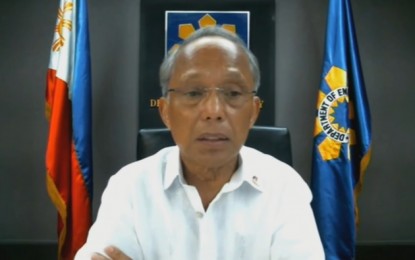
ENERGY WEEK. Energy Secretary Alfonso Cusi speaks at the virtual Siemens Energy Asia Pacific Energy Week on Tuesday (March 9, 2021). Cusi said his office is conducting a study whether it is advisable for the Philippines to have its power sector to be completely owned by the private sector only. (Screengrab from Siemens Energy Asia Pacific Energy Week)
MANILA – Department of Energy (DOE) Secretary Alfonso Cusi said Tuesday his office is conducting a study whether it is advisable for a developing country like the Philippines to have its power sector to be completely owned by the private sector only.
Speaking at the virtual panel session of Siemens Energy Asia Pacific Energy Week, Cusi said of the 10 countries they have studied, Japan is the only country that liberalized its energy sector.
In neighboring countries like Indonesia, its government still has great participation in all aspects of the power sector, he added.
“For developing countries like us, we have our landscape —our energy landscape is in the hands of the private sector. From generation to distribution and transmission, they are all in the hands of (the) private sector. And we’re looking at that because we are looking at the public interest whether it is advisable for (a) developing country to give it all to (the) private sector,” he said.
The energy chief said this is part of the government’s effort to bring down power rates, improve accessibility to electricity, and ensure stable and reliable power supply.
Cusi said 5 percent of the population still has no access to power, while power rates in the Philippines is higher than neighboring countries.
“These are the things we are trying to do for our country… whether to secure, to protect the interest of the public, if the government should participate in the generation —power generation— so we can develop a good reserve,” he said.
Aside from addressing the challenges of accessibility and affordability, Cusi added the DOE is pushing for transition to clean energy.
Among the DOE’s initiatives to transition to a cleaner source of power include issuing a moratorium on greenfield coal power projects, promoting renewable energy and indigenous resources, exploring nuclear power to be included in the energy mix, and developing hydrogen as the fuel of the future to be used for power generation.
Forty-eight percent of the country’s power generation mix is still coal, 26 percent renewable, and 21 percent natural gas. (PNA)
